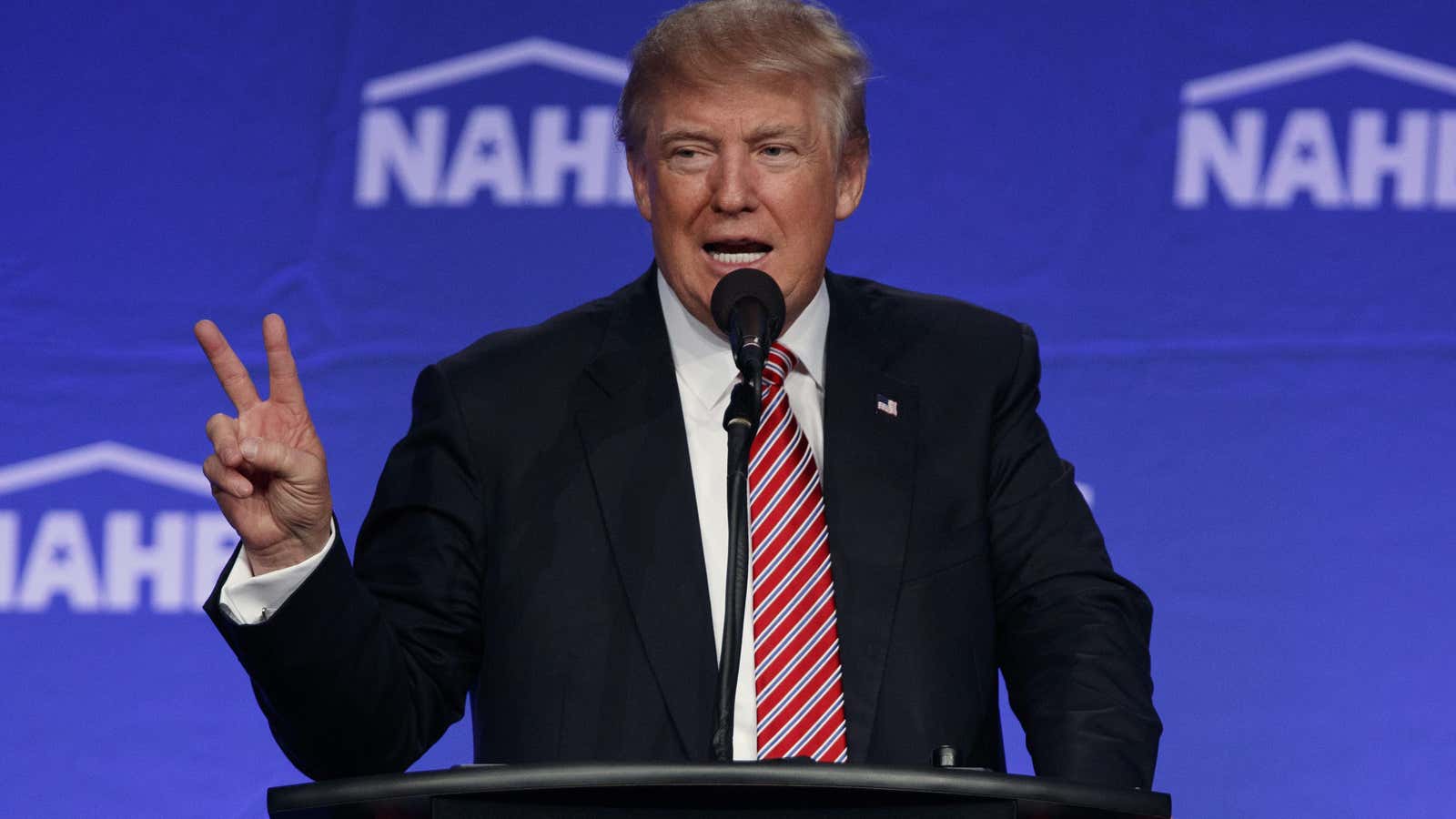US presidential candidate and Yum! Brands connoisseur Donald Trump enjoys absurdly low support from various American groups, namely blacks and Hispanics. An NBC News poll from July found that 0% of black voters supported Trump in the crucial battleground states of Ohio and Pennsylvania. As it turns out, there’s another group of Americans who don’t care for the businessman—historians.
There are reportedly only five historians in the United States who openly support Donald Trump, according to Rick Shenkman, the publisher of History News Network, a site that curates op-eds by historians and publishes news about the profession. (Shenkman himself is not an academic, though HNN’s advisory board counts several academic historians, including professors of history at Harvard, UCLA, and Notre Dame.)
Of the five HNN found, two are academic historians: Victor Davis Hanson, a senior fellow at Stanford University’s Hoover Institute who penned an article in the National Review explaining why he supports Trump over Hillary Clinton, and Timothy R. Furnish, a former professor and consultant to the US Intelligence Community who tweeted last week that he’ll vote for Trump.
A third academic, Wilfred McClay, who was originally included as a Trump supporter in Shenkman’s analysis, wrote to HNN to say that he didn’t actually support Trump. There’s also, of course, Newt Gingrich, the former politician who endorsed Trump early on, holds a Ph.D. in history from Tulane University, and taught history at the University of West Georgia for a couple years in the 1970s.
Meanwhile, over 600 historians—both academic and non-academic—signed a letter denouncing Trump in July, arguing that their collective expertise in history made them worried about the prospect of a Trump presidency:
Historians of different specialties, eras and regions understand the enduring appeal of demagogues, the promise and peril of populism, and the political uses of bigotry and scapegoating. Historians understand the impact these phenomena have upon society’s most vulnerable and upon a nation’s conscience. The lessons of history compel us to speak out against a movement rooted in fear and authoritarianism. The lessons of history compel us to speak out against Trump.
That same month, dozens of established historians began posting videos tinged with a similar sentiment on a Facebook page called “Historians on Donald Trump.” Here’s writer Ron Chernow explaining why he believes Trump must not be president:
(Chernow is the Pulitzer Prize-winning author of the Alexander Hamilton biography on which a certain popular Broadway musical was based.)
Among the distinguished academic historians to condemn Trump with videos on the Facebook page are Nell Irvin Painter, Michael Kazin, Joseph Ellis, Bernard Weisberger, and William Leuchtenburg. Other prominent, non-academic historians to contribute to the page include David McCullough, Ken Burns, and Robert Caro.
Not every historian is going along with the “Historians Against Trump” movement. Jonathan Zimmerman, a professor of education and history at New York University, voiced his disdain for Trump but could not support a movement he believed ran contrary to the ethics of the profession. “I think Trump is wrong for America, but I won’t pretend that my discipline has elucidated the one right way to look at him,” Zimmerman wrote in an op-ed for the Chronicle of Higher Education. “That goes against everything history stands for.”
As Shenkman noted, historians—and academics, in general—lean liberal politically. It shouldn’t be shocking that there few historians have publicly endorsed the Republican candidate for president, or that many of them have explicitly come out against him.
But only two? To put that in perspective, there were 8,751 full-time tenured or tenure-track historians at universities in the US last year, according to the American Historical Association. There are certainly more who support Trump but haven’t said so openly. But compared to the number who have publicly denounced him, Trump’s lack of support among the country’s foremost purveyors of historical perspective is disconcerting at best, and frightening at worst.
In the grand scheme of things, “historians”—as a voting bloc—is extremely small. They won’t swing the election one way or the other. That said, when the people who best know the consequences of someone like Donald Trump assuming political office have mobilized so firmly against him, perhaps it’s wise to listen.
